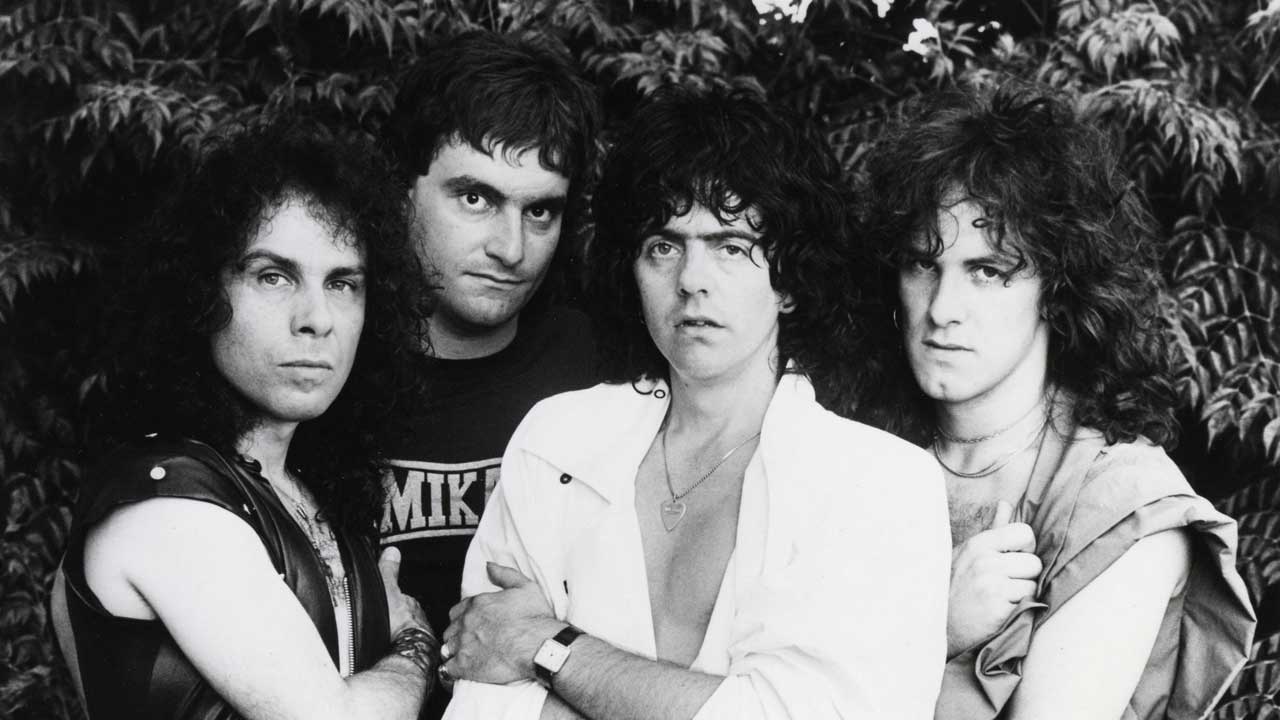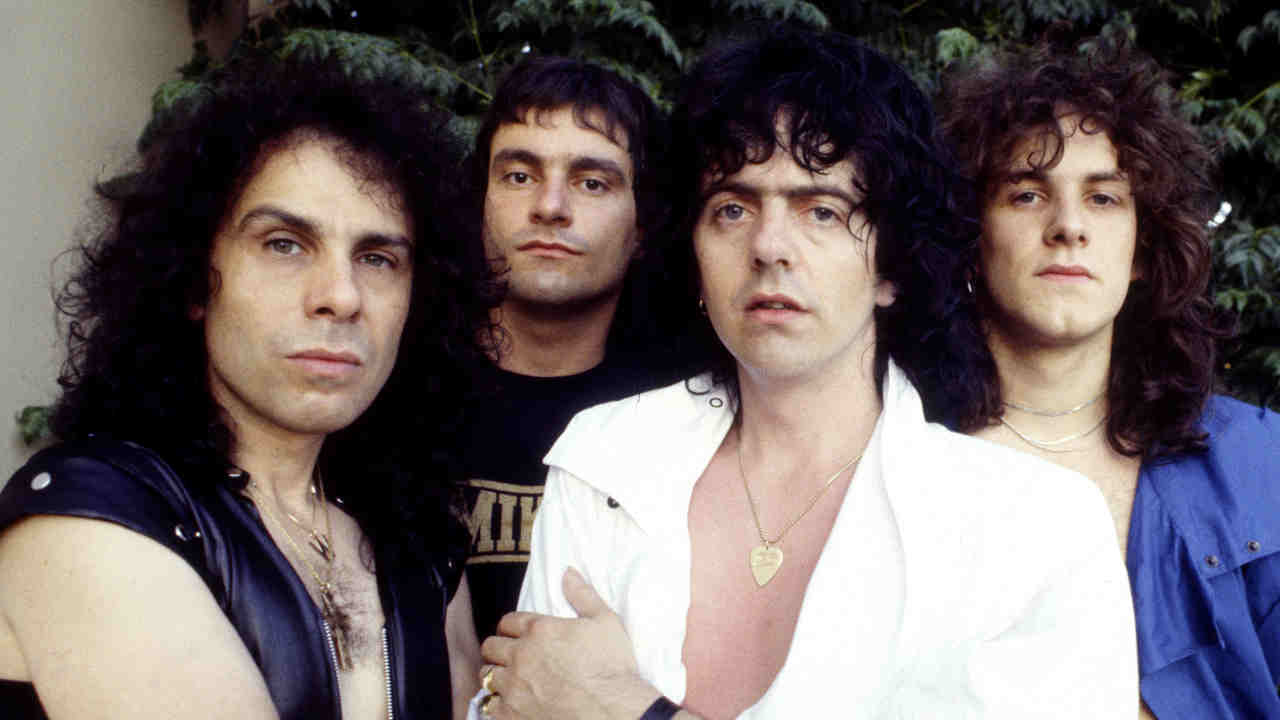"It was weird just being in the same room as him": The story of the Ronnie James Dio classic assembled from other bands' spare parts
Rainbow In The Dark a highlight of Holy Diver, an album Ronnie James Dio said was “one of the proudest things I’ve ever done”

As Ronnie James Dio told me a year before he died in 2010: “To be in one world-famous band is more than most musicians can ever dream. To be in two is almost being greedy. But to find yourself being a success for a third time, especially when it’s with your own band this time, well, I consider myself extremely fortunate.”
Indeed few would have predicted that Dio would survive being ousted from Rainbow, in 1979, for “refusing to sing commercial pop-rock rubbish like Since You Been Gone”. He had, after all been the singer on one of the all-time classic albums, Rainbow Rising.
When it was then announced that he would be replacing Ozzy Osbourne in Black Sabbath it was surely the final nail in the band’s coffin, simply unimaginable. Yet his arrival resurrected Sabbath’s career, with the recording of Heaven And Hell, another album now regarded as a monumental rock classic.
When he left Sabbath, though, Dio pulled off his most amazing feat yet: his first solo album, Holy Diver. In a year when both Rainbow (with the abysmal Bent Out Of Shape) and Sabbath (the laughable Born To Die) both appeared to be on their last legs, Holy Diver looked down with contempt from a great height.
Aside from the totemic title track, the other landmark track on the album, and its signature single, was Rainbow In The Dark. According to Dio guitarist Vivian Campbell, its mammoth riff “used to be a Sweet Savage song called Lady Marianne”.
Sweet Savage was the Belfast-based band Campbell had formed as a teenager before landing the gig, at age 20, with the fledgling Dio line-up.
“I probably in the back of my mind didn’t think that Sweet Savage was gonna continue, because I was so much part of the band. But all the music in Rainbow In The Dark, was from a Sweet Savage song that I wrote when I was sixteen.”
Sign up below to get the latest from Classic Rock, plus exclusive special offers, direct to your inbox!
Campbell recalled how the genesis of the Dio song came from a loose jam session he and bassist Jimmy Bain and drummer Vinny Appice had been having fun with when Ronnie arrived at the rehearsal studio one day. “There was always a bit more tension in the room when Ronnie came in to rehearsal. He was definitely the boss.”
Dio had first worked with Bain in Rainbow. Appice had been the drummer in Sabbath during the latter-days of Ronnie’s time in them. “Jimmy and Vinny and I would just kick around riffs. We’d start playing it, and Vinny would give it his own unique flavour.
"There’s no one on the planet plays drums like Vinny Appice. He invented the beat. Whenever I was writing something, in my head as I was playing I’d be thinking the snare goes here and the bass goes there. And nine times out of ten Vinny would reverse that. That’s what he did on Rainbow In The Dark."
“But we played it for Ronnie, and he almost immediately started singing the melody on top of it. And then during one of the breaks Jimmy went over to this little Yamaha keyboard we had set up, and came up with the little keyboard motif and that was it, we had the fucking song written in ten minutes.”
That “little keyboard motif” that Bain came up with was actually a vamp on the keyboard part for a song called Criminal Tendencies, which he’d originally written for his previous band, Wild Horses.
Of course, none of this would have achieved musical lift-off if it hadn’t been for Dio’s gift for melody – a talent he’d developed during his childhood years learning to play trumpet – and his lion’s roar of a voice. His lyrics were also top shelf Dio: ‘I cry out for magic, I feel it dancing in the night/It was cold, I lost my hold, to the shadows of the night…’
“He was totally different from most rock singers I’d met,” recalls Ronnie’s wife and manager, Wendy Dio. “He was smart; he would read a book a day.”
The construction of Rainbow In The Dark was further proof of the amount of deep thought that Ronnie Dio had put into the launch of his own band.
“It would have been easy for me to pick up a couple of hotshots from the Sunset Strip scene and just throw a band together,” he would later tell me. “But I’d worked with so many great British musicians in Rainbow and Sabbath, I wanted to keep that blend of American and British rock style.”
It was primarily for this reason that Ronnie passed on the chance to bring a young Jake E. Lee into the line-up. (Lee would later make his name as the flash guitarist in Ozzy’s solo band.) Before Bain came in, there had been discussions with Australian former Rainbow bassist Bob Daisley. (Strange to relate, but Daisley would also join Ozzy’s band along with Lee.)
It was Bain who suggested bringing in a complete unknown guitarist called Vivian Campbell. “I had two guys in mind,” Bain told me, “One was John Sykes, the other was Vivian.” With Sykes already committed to a regular paycheck from Whitesnake, Dio gave Campbell a shot – and thus was born one of the quintessential 80s metal line-ups.
As a starry-eyed 20-year-old, Campbell couldn’t believe his luck. “I was a big Rainbow fan and I’d played the shit out of the Heaven And Hell album. To me, Dio was a big star, and it was weird just being in the same room as him.”
Within weeks the new four-piece were in LA, working at the Sound City duplex in Van Nuys: a courtyard with a rehearsal room on one side and a recording studio on the other, where down the years many a now classic album would be recorded.
“We used to go in there every night and we were having a great time,” Campbell recalls. “We were smoking a lot of pot, friends would come down. It was a great atmosphere.” They would finish working on the songs and then record them often the same night.
“We didn’t even break the equipment down,” says Campbell, “we just rolled it over the parking lot to the studio.” The end result, as epitomised by the track Rainbow In The Dark, was “one of the proudest things I’ve ever done,” beamed Ronnie. “Rock, but not just noise. A great song with great playing.”
Mick Wall is the UK's best-known rock writer, author and TV and radio programme maker, and is the author of numerous critically-acclaimed books, including definitive, bestselling titles on Led Zeppelin (When Giants Walked the Earth), Metallica (Enter Night), AC/DC (Hell Ain't a Bad Place To Be), Black Sabbath (Symptom of the Universe), Lou Reed, The Doors (Love Becomes a Funeral Pyre), Guns N' Roses and Lemmy. He lives in England.
You must confirm your public display name before commenting
Please logout and then login again, you will then be prompted to enter your display name.


![Dio - Rainbow In The Dark (Official Music Video) [HD] - YouTube](https://img.youtube.com/vi/PrBUjXaRSUQ/maxresdefault.jpg)

